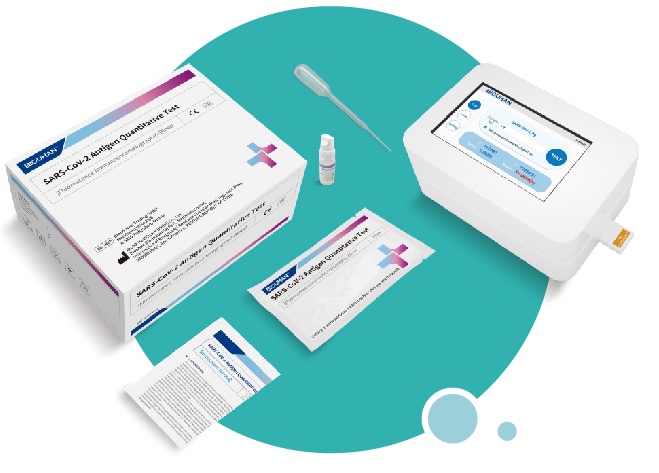Exceptionally sensitive POCT test that reliably detects SARS-CoV-2 infection
Special offer for general practitioners here
- Extremely high sensitivity and specificity of the test
- Swabbing from the front of the nose and simple procedure as for a normal antigen test
- Reading of the result after 15 min. using the sophisticated BOH-180 analyzer
- Quantitative result that indicates the amount of viral load
- Fluorescence immunochromatography has up to 10 times higher sensitivity compared to the colloidal-gold method used in conventional antigen tests.
- In addition, the sensitivity of the test is increased by instrumental readout using the BOH-180 analyzer.
- The omicron variant, according to bioanalytical analysis and clinical evaluations, does not affect the sensitivity and performance of the test in any way, unlike conventional antigen tests.
- The test has been routinely used for over a year in more than 30 hospitals in the Czech Republic and is recommended in several professional guidelines.*
- The exceptional sensitivity of the test has been confirmed in independent evaluations of the most prestigious German institutes Robert Koch Institute and Paul-Ehrlich-Institute as well as in the Institute of Organic Chemistry and Biochemistry, Academy of Sciences of the Czech Republic.**
- LoD 3,5 pg/ml
- Sensitivity: 97,12%
- Specificity: 99,60%
Content:
- 25 Test Cassettes; 1 Instructions for Use; 25 Swabs; 25 Extraction Buffer; 25 Extraction Tubes with Caps
Instruction video:
Downloads: Instruction for Use
* Expert statement SLM a SZÚ „Průkaz nukleokapsidového antigenu SARS-CoV-2 v lidském séru“
INTERNATIONAL OPINION on the use of monoclonal antibodies in the treatment and post-exposure prophylaxis of COVID-19
** Establishment of an evaluation panel for the decentralized technical evaluation of the sensitivity of 31 rapid detection tests for SARS-CoV-2 diagnostics; Robert Koch Institute, Germany;
Comparative sensitivity evaluation for 122 CE-marked SARS-CoV-2 antigen rapid tests; Paul-Ehrlich-Institute, Germany;
Methodology, objectives and results of antigenic assays; Institute of Organic Chemistry and Biochemistry, Academy of Sciences of the Czech Republic, Prague

